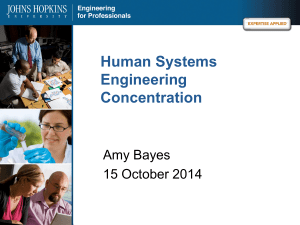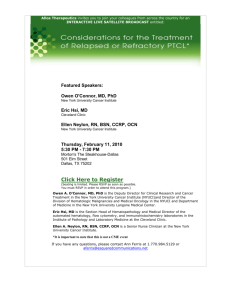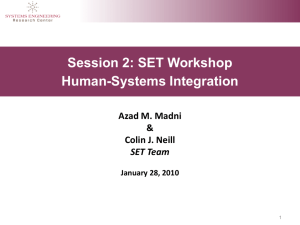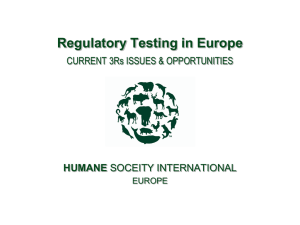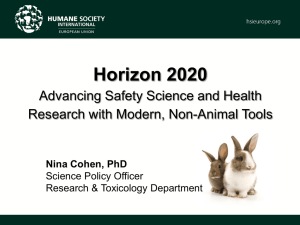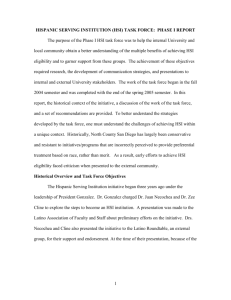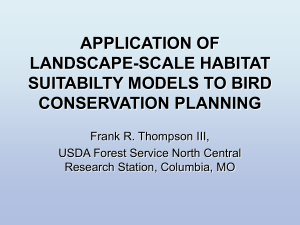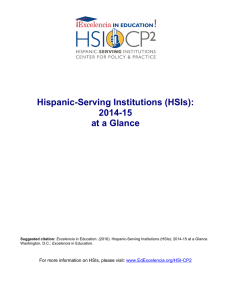HSI Phase III Town Hall Presentation
advertisement
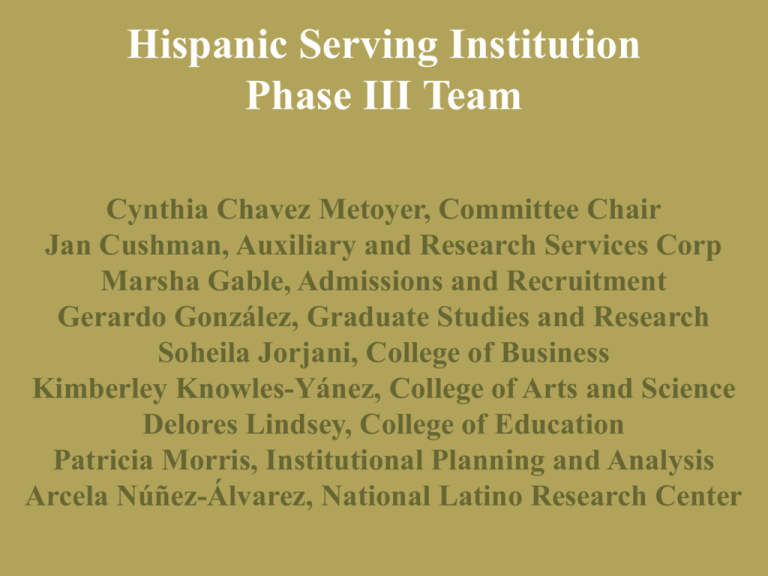
Hispanic Serving Institution Phase III Team Cynthia Chavez Metoyer, Committee Chair Jan Cushman, Auxiliary and Research Services Corp Marsha Gable, Admissions and Recruitment Gerardo González, Graduate Studies and Research Soheila Jorjani, College of Business Kimberley Knowles-Yánez, College of Arts and Science Delores Lindsey, College of Education Patricia Morris, Institutional Planning and Analysis Arcela Núñez-Álvarez, National Latino Research Center AGENDA • Welcome • Cynthia Chavez Metoyer – HSI Eligibility – HSI History at CSUSM • Implication of HSI • Gerardo González Status and Grant Opportunities • Jan Cushman • Brainstorming and support for your ideas • All • Questions AGENDA • Welcome • Cynthia Chavez Metoyer – HSI Eligibility • HSI History at • CSUSM • Implication of HSI • Status and Grant Opportunities • • Brainstorming and support for your ideas • • Questions Arcela Núñez-Álvarez Gerardo González Jan Cushman All Hispanic Serving Institution • Defined by federal agencies as an accredited U.S. college or university with at least 25 percent Hispanic full-time student enrollment. • There are approximately 268 HSIs in the U.S. and Puerto Rico serving more than 1,000,000 Hispanic students. •51% of all Hispanic students enrolled in post-secondary schools •13 CSU campuses are HSIs •HSI institutions qualified for federal grants – ($117 million for Title V programs in FY 2010) • http://www2.csusm.edu/hsi/ Phase III Task Force Charge • To prepare institutional application for HSI status upon eligibility. • To establish an internal application process for HSI-related grant proposals that ensures: 1) the advancement of the University’s strategic priorities; and 2) that proposals are inclusive and address educational equity and diversity. Percent of Undergraduate Students Latino/a Undergraduate FTES Headcount by Semester, Fall 2004-Spring 2010 28 27 26 25 24 23 22 21 20 FA04 SP05 FA05 SP06 FA06 SP07 FA07 SP08 FA08 SP09 FA09 SP10 %FTES 20.2 20.7 20.4 20.5 21.8 22.1 22.7 23.0 24.6 25.1 27.2 27.5 %Headcount 20.5 20.8 20.8 20.6 21.6 22.2 23.2 23.0 24.8 25.2 27.4 27.3 GOAL 25.0 25.0 25.0 25.0 25.0 25.0 25.0 25.0 25.0 25.0 25.0 25.0 History of HSI • CSUSM is aligned with the objectives of HSI long before starting the official process of recognition. • HSI task force appointed by President Haynes (2004) • Three phases: – Phase I: Educational campaign - Community Awareness – Internal and external (AY 2004 – 2005) – Phase II: Explore and develop strategies for outreach, recruitment, and retention (20052009) – Phase III: Achieved HSI status; will establish internal process for HSI-related grant proposals (AY 2009-2010) Phase I Committee Members Gerardo González, Chair David Barsky, Academic Programs Matthew Ceppi, IPA, President’s Office Nathan Evans, Student Affairs Bill de la Fuente, Hispanic Advisory Council Karen Perez, Student Representative Soheila Jorjani, College of Business Lorena Meza, Student Affairs Susan Mitchell, Student Affairs Tracey Richardson, AAFSA Garry Rolison, Educational Equity & Diversity Lourdes Shahamiri, Educational Equity Task Force Advisory Board Tomás Arciniega, President Emeritus CSU, Bakersfield Glen Brodowsky, College of Business Darren Bush, Student Affairs Berta Cuaron, Palomar College Joe Madrigal, Palomar College Juan Necochea, College of Education Freddie Ramirez , Miracosta College Victor Rocha, COA&S Gilberto Valadez, College of Education Phase II • Explore and develop strategies for outreach, recruitment, and retention – Outreach and Recruitment – Remediation and Retention Phase II Committee Members Nathan Evans, Director, Admissions & Recruitment Soheila Jorjani, Professor, College of Business Jeffrey Marks, Research Analyst, IP&A Tracey Richardson, Events Scheduling Manager Lorena Meza, Associate Vice President, SASS Gilbert Valadez, Professor College of Education Outreach, Recruitment and Retention Early Outreach Efforts – Parent Institute for Quality Education (PIQE) – I’m Going to College programs – College: Making It Happen – Collaboration with GEAR-UP programs – Collaboration with Encuentros Outreach, Recruitment and Retention Recruitment Efforts – Focused participation in programs at schools and districts with high numbers of Latino/a students – Partnerships with San Marcos, Escondido and other school districts promoting preparation and guaranteed admission – Increased campus tours by school groups – Participation in Imperial County initiatives – Letters from LAFS to newly admitted students Outreach, Recruitment and Retention Communications in Spanish – Launched website in Spanish – Content was a collaboration between representatives from Academic Affairs and Student Affairs – Intended audience is parents and family members – Information on benefits of college, preparation for college, financial aid and services available What are the Benefits of HSI Status? • Campus Benefits – Support faculty development – Improve student retention and graduation – Enrich the curricula • Community Benefits – Enhance access – Engage diverse populations – Promote future leadership • Federal HSI external grant programs – Resources to support HSIs What are the HSI Grant Programs? • Department of Education (DoEd) Title V Developing HSIs Undergraduate and Graduate Programs • United States Department of Agriculture (USDA) HSI Higher Education Grants Program • Housing and Urban Development (HUD) Office of University Partnership (OUP) HSIAC Program • National Endowment for the Humanities (NEH) Humanities Initiatives at Institutions with High Hispanic Enrollment Title V: Developing Hispanic-Serving Institutions Program • Enhance and expand HSIs capacity to serve Hispanic and low-income students by providing funds to improve and strengthen the academic quality, institutional stability, management, and fiscal capabilities • Supports faculty development; funds and administrative management; development and improvement of academic programs; endowment funds; curriculum development; scientific or laboratory equipment for teaching; renovation of instructional facilities; joint use of facilities; academic tutoring; counseling programs; and student support services • Total approximately $600,000 per year for 5 years • Deadline: Late Spring 2010 USDA HSI Higher Education Grants Program • Promote and strengthen the ability of HSIs to carry out higher education programs in the food and agricultural sciences. • Attract outstanding students and produce graduates capable of enhancing the nation's food and agricultural scientific and professional work force • Supports projects that: (a) reshape curricula for a changing agricultural system; (b) prepare faculty to teach a changing student clientele; (c) prepare instructional delivery systems; (d) acquire scientific instrumentation for teaching; (e) develop student experiential learning opportunities for underrepresented students; or (f) recruit and retain underrepresented students • Individual or collaborative institutional projects • Total $300,000 over 2-3 years • Deadline: February 2010 HUD OUP HSIAC Program • Revitalize local communities while fostering longterm changes in the way HSIs relate to their neighbors by facilitating partnerships that address the critical social and economic issues including poverty, education, housing, healthcare, and local neighborhood capacity building. • Assist HSIs in integrating community engagement themes into their curriculum, academic studies, and student activities. • Total $600,000 over 3 years • Deadline: August 2010 NEH HSI Humanities Initiatives • Strengthen and enrich humanities education and scholarship at HSIs • Grants may be used to enhance the humanities content of existing programs, develop new programs, or lay the foundation for more extensive endeavors • Total $100,000 over 1-2 years • Deadline: June 2010 NEH Faculty Research Awards • Support advanced research in the humanities by faculty members at HSIs • Produce articles, monographs, books, digital materials, archaeological site reports, translations, editions, and other scholarly tools • Maximum stipend is $4,200 per month for 6-12 months • Deadline: May 2010 HSI External Funding Process Preliminary Steps - Contacts Office of Graduate Studies & Research Dr. Gerardo González, AVP for Research UARSC Office of Sponsored Projects Jan Cushman, Sponsored Projects Administrator University Advancement Melinda Newsome, AVP of Development HSI External Funding Process Preliminary Steps – Resources/Support • Connect with colleagues to brainstorm ideas • Assist with the development of a project concept and preliminary budget • Provide seed funding for initial proposal development costs • Identify suitable funding sources for your project Questions?
